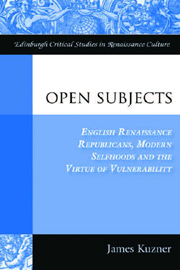Book contents
- Frontmatter
- Contents
- Acknowledgements
- Series Editor's Preface
- Introduction: Vulnerable Crests of Renaissance Selves
- 1 Legacies of Republicanism, Histories of the Self
- 2 ‘Without Respect of Utility’: Precarious Life and the Politics of Edmund Spenser's Legend of Friendship
- 3 Unbuilding the City: Coriolanus, Titus Andronicus and the Forms of Openness
- 4 ‘That Transubstantiall solacisme’: Andrew Marvell, Linguistic Vulnerability and the Space of the Subject
- 5 Habermas Goes to Hell: Pleasure, Public Reason and the Republicanism of Paradise Lost
- Epilogue: The Futures of Open Subjects
- Index
4 - ‘That Transubstantiall solacisme’: Andrew Marvell, Linguistic Vulnerability and the Space of the Subject
Published online by Cambridge University Press: 12 September 2012
- Frontmatter
- Contents
- Acknowledgements
- Series Editor's Preface
- Introduction: Vulnerable Crests of Renaissance Selves
- 1 Legacies of Republicanism, Histories of the Self
- 2 ‘Without Respect of Utility’: Precarious Life and the Politics of Edmund Spenser's Legend of Friendship
- 3 Unbuilding the City: Coriolanus, Titus Andronicus and the Forms of Openness
- 4 ‘That Transubstantiall solacisme’: Andrew Marvell, Linguistic Vulnerability and the Space of the Subject
- 5 Habermas Goes to Hell: Pleasure, Public Reason and the Republicanism of Paradise Lost
- Epilogue: The Futures of Open Subjects
- Index
Summary
Spenser and Shakespeare, I have argued, imagine social experiences wherein vulnerability can become a definite good. Their characters exist most intensely and admirably when the self's integrity becomes briefly unthinkable. While I have not dwelled much on the point, such exposure often occurs during discussion – when, for instance, Britomart and Amoret relate their hard adventures to each other, or when Aufidius tells his dream to his rival. In these moments, speech does not merely express their vulnerability but also creates it – communicates it in some literal sense. The next two chapters, on Andrew Marvell and John Milton, fasten more intently on creation of this kind. They detail how linguistic vulnerabilities have existed and may yet exist.
In the first part of this chapter I address the issue fairly narrowly, examining Marvell's attitude toward Catholicism and especially toward concepts of transubstantiation and transubstantial language. Describing ways that ‘transubstantial’ words could be spoken in early modernity, I show how the term could refer not simply to the transformation of bread into the body of Christ but to any utterance aimed at producing direct material effects on the bodies of the world. Those bodies included human ones, and so believing in transubstantial language often meant living with an intense and expansive sense of the power that words have to penetrate, expand, erode and transform persons. Though believing this may seem atavistic, work by Judith Butler shows how linguistic vulnerability is very much still with us.
- Type
- Chapter
- Information
- Open SubjectsEnglish Renaissance Republicans Modern Selfhoods and the Virtue of Vulnerability, pp. 125 - 164Publisher: Edinburgh University PressPrint publication year: 2011



